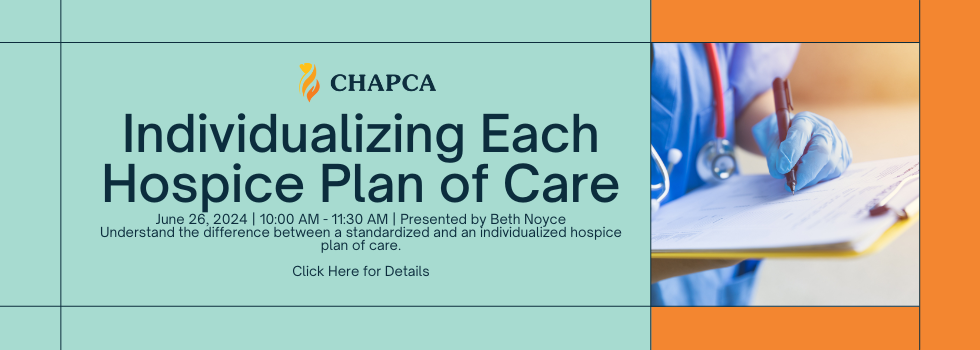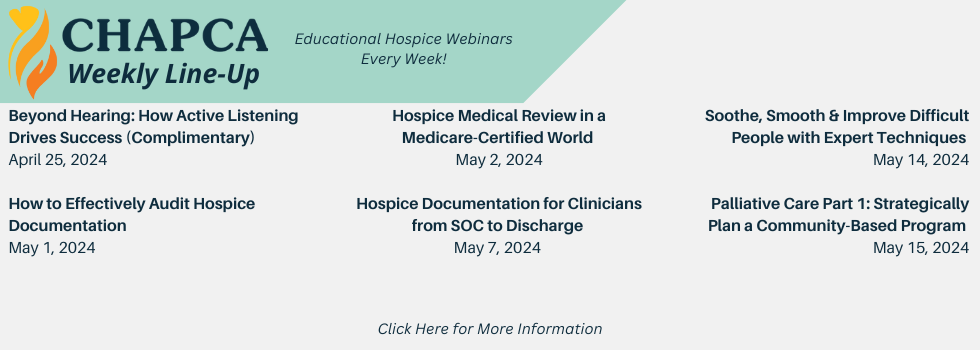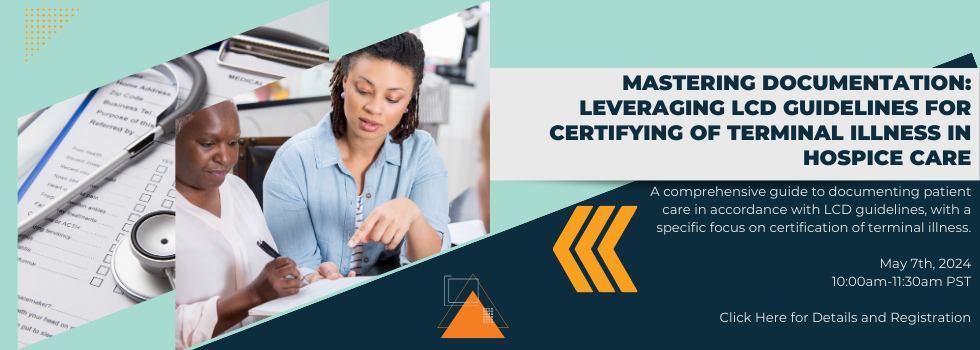- What is Hospice and Palliative Care?
- History of Hospice
- What is Hospice Care?
- What is Palliative Care?
- What is Aid in Dying?
- Don't Wait to Talk about the Care You Would Want
- Caregiving, What’s Your Plan?
- Life Stories Create Memories
- Advance Directives
- Get Your Advance Care Planning Guide
- Choosing a Hospice or Palliative Care Provider
- Grief and Loss
- CHAPCA Resources Library
- Additional Helpful Websites
- Hospice Fraud
- Program | Services | Jobs
- Join CHAPCA
- Donate | Advocate | Volunteer
- About Us
Home
|
California Fraud Enforcement: Lessons for Providers
Wednesday, May 10, 2023, 10:00 AM - 11:30 AM PDT
Category: Live Webinar
California Fraud Enforcement Actions: Lessons for ProvidersWebinar Details:This presentation will address key areas of fraud enforcement, including application of the Anti-Kickback statute and False Claims Act, payments to referring physicians, gifts to referring physicians, and waiver of co-pays and deductibles. Learning Objective:
FIRST LESSON: FRAUD AND ABUSE PROHIBITIONS APPLY TO ALL FEDERAL AND STATE HEALTH CARE PROGRAMS, NOT JUST THE MEDICARE PROGRAM Enforcement action was taken against Progenity by multiple state and federal health care programs, including the VA, various state Medicaid Programs, TRICARE, and the Federal Employees Health Benefits Program. This means, for example, that companies that provide private duty services that may be paid for, at least in part, by any federal or state healthcare program must comply with the federal False Claims Act and the Anti-Kickback Statute, and applicable state requirements. Many private insurers have followed the federal government’s lead in terms of fraud and abuse enforcement. SECOND LESSON: PROVIDERS MUST PAY PHYSICIANS AT FAIR MARKET VALUE FOR SERVICES ACTUALLY RENDERED The government alleged that Progenity induced physicians to order lab tests by providing kickbacks. This claim was based on the fact that the “draw fees” that Progenity paid to physicians to draw blood for lab tests exceeded the fair market value of the services performed. Providers must address the issue of payments at fair market value to physicians who both make referrals and provide services to them. The most effective way for many providers to meet this requirement is to pay physicians at an hourly rate at fair market value for services actually rendered. In other words, flat monthly amounts are likely inappropriate because providers run the risk of payment for services that were not rendered or payments for services at rates above fair market value. THIRD LESSON: PROVIDERS’ GIFTS OF NOMINAL VALUE TO PHYSICIANS CANNOT EXCEED THE CURRENT FEDERAL LIIMIT OF $489.00 PER YEAR Progenity also provided kickbacks in the form of food and alcohol to physicians and their staff at “gatherings,” including happy hours and holiday parties. There was rarely any educational content provided during these events. One sales representative for Progenity, for example, spent $65,658 on meals and alcohol for physicians during a single year. Providers may give referring physicians non-cash, non-monetary equivalent items of nominal value worth no more than $489.00 per calendar year in 2023. Monetary equivalents include gift cards and gift certificates. Providers must track what they give physicians to help ensure that they do not exceed this limit. Enforcers have repeatedly said that providers are responsible to show how much they spent. FOURTH LESSON: PROVIDERS CANNOT ROUTINELY WAIVE CO-PAYMENTS AND DEDUCTIBLES UNLESS THEY MAKE INDIVIDUALIZED DETERMINATIONS OF FINANCIAL NEED AND/OR MAKE REASONABLE COLLECTION EFFORTS Progenity provided kickbacks to patients in the form of waivers of coinsurance and deductible payments and had agreements with physicians to do so on a regular basis. This means that providers must have policies and procedures that govern the waiver of co-payments and deductibles, including criteria that are used to determine financial need. These policies and procedures must be consistently applied.
The information above isn’t new. Enforcement actions on the bases described above are “low-hanging fruit.” Make it tougher for enforcers to take action by taking the steps described above!
Presented By: Elizabeth E. Hogue, Esq. | JD, Fellow AHLA Bio: Elizabeth E. Hogue is an attorney in private practice with extensive experience in health care. Prior to becoming an attorney, she was employed as a personnel manager by a Blue Cross-Blue Shield Plan. She studied at the University of Maryland School of Law, concentrating in health law. She gained considerable clinical experience, course work and employment experience in this area. She graduated cum laude. Following her admission to the Bar, she developed an active practice in health law. She represents clients all over the country. Her clients are professional associations, physicians, managed care providers, ACOs and institutional health care providers, including hospitals, long-term care facilities, home health agencies, durable medical equipment companies, private duty agencies and hospices. She has also represented a number of individual providers and case managers concerning health-related issues.
Register Here |






 Prev Month
Prev Month View Month
View Month Search
Search Go to Month
Go to Month Next Month
Next Month Export Event
Export Event 